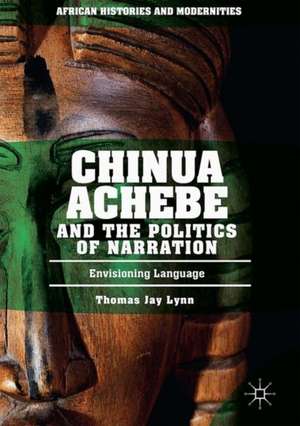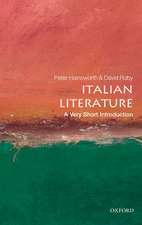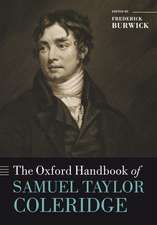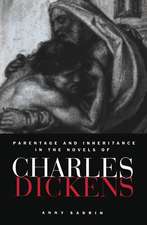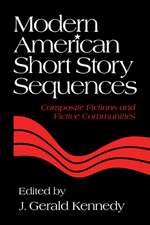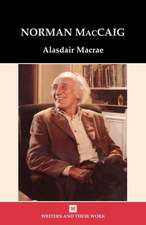Chinua Achebe and the Politics of Narration: Envisioning Language: African Histories and Modernities
Autor Thomas Jay Lynnen Limba Engleză Hardback – 28 iul 2017
| Toate formatele și edițiile | Preț | Express |
|---|---|---|
| Paperback (1) | 490.05 lei 38-44 zile | |
| Springer International Publishing – aug 2018 | 490.05 lei 38-44 zile | |
| Hardback (1) | 582.63 lei 6-8 săpt. | |
| Springer International Publishing – 28 iul 2017 | 582.63 lei 6-8 săpt. |
Din seria African Histories and Modernities
- 15%
 Preț: 695.01 lei
Preț: 695.01 lei - 20%
 Preț: 815.69 lei
Preț: 815.69 lei -
 Preț: 384.09 lei
Preț: 384.09 lei - 15%
 Preț: 577.54 lei
Preț: 577.54 lei - 18%
 Preț: 733.33 lei
Preț: 733.33 lei - 18%
 Preț: 734.27 lei
Preț: 734.27 lei - 18%
 Preț: 739.31 lei
Preț: 739.31 lei - 15%
 Preț: 587.85 lei
Preț: 587.85 lei - 15%
 Preț: 642.51 lei
Preț: 642.51 lei -
 Preț: 418.45 lei
Preț: 418.45 lei - 15%
 Preț: 641.71 lei
Preț: 641.71 lei - 15%
 Preț: 704.17 lei
Preț: 704.17 lei - 18%
 Preț: 733.33 lei
Preț: 733.33 lei - 15%
 Preț: 703.38 lei
Preț: 703.38 lei - 15%
 Preț: 527.32 lei
Preț: 527.32 lei - 15%
 Preț: 698.94 lei
Preț: 698.94 lei -
 Preț: 485.61 lei
Preț: 485.61 lei -
 Preț: 386.99 lei
Preț: 386.99 lei - 15%
 Preț: 704.87 lei
Preț: 704.87 lei - 18%
 Preț: 781.45 lei
Preț: 781.45 lei - 18%
 Preț: 894.97 lei
Preț: 894.97 lei - 15%
 Preț: 694.69 lei
Preț: 694.69 lei - 9%
 Preț: 753.51 lei
Preț: 753.51 lei - 15%
 Preț: 641.16 lei
Preț: 641.16 lei - 18%
 Preț: 783.20 lei
Preț: 783.20 lei - 15%
 Preț: 643.00 lei
Preț: 643.00 lei - 18%
 Preț: 900.49 lei
Preț: 900.49 lei - 15%
 Preț: 699.59 lei
Preț: 699.59 lei - 15%
 Preț: 644.49 lei
Preț: 644.49 lei - 15%
 Preț: 587.53 lei
Preț: 587.53 lei - 15%
 Preț: 703.06 lei
Preț: 703.06 lei - 15%
 Preț: 587.39 lei
Preț: 587.39 lei - 15%
 Preț: 586.88 lei
Preț: 586.88 lei -
 Preț: 385.47 lei
Preț: 385.47 lei - 15%
 Preț: 703.71 lei
Preț: 703.71 lei - 18%
 Preț: 744.22 lei
Preț: 744.22 lei - 15%
 Preț: 643.16 lei
Preț: 643.16 lei - 15%
 Preț: 590.95 lei
Preț: 590.95 lei - 15%
 Preț: 587.53 lei
Preț: 587.53 lei
Preț: 582.63 lei
Preț vechi: 685.45 lei
-15% Nou
Puncte Express: 874
Preț estimativ în valută:
111.50€ • 115.98$ • 92.05£
111.50€ • 115.98$ • 92.05£
Carte tipărită la comandă
Livrare economică 15-29 aprilie
Preluare comenzi: 021 569.72.76
Specificații
ISBN-13: 9783319513300
ISBN-10: 3319513303
Pagini: 181
Ilustrații: IX, 176 p.
Dimensiuni: 148 x 210 mm
Greutate: 0.38 kg
Ediția:1st ed. 2017
Editura: Springer International Publishing
Colecția Palgrave Macmillan
Seria African Histories and Modernities
Locul publicării:Cham, Switzerland
ISBN-10: 3319513303
Pagini: 181
Ilustrații: IX, 176 p.
Dimensiuni: 148 x 210 mm
Greutate: 0.38 kg
Ediția:1st ed. 2017
Editura: Springer International Publishing
Colecția Palgrave Macmillan
Seria African Histories and Modernities
Locul publicării:Cham, Switzerland
Cuprins
1. Introduction.- 2. An Adequate Revolution: Achebe Writes Africa Anew.- 3. Of Flight, Fraud, and Freedom: Achebe’s Political Tricksters.- 4. Language and Ambivalence in Achebe’s Writing.- 5. Language and the Power of Subordination: Achebe’s Integration of Nigerian Pidgin.- 6. Beyond Black and White: British Identity in Achebe’s Fiction.- 7. Catastrophe, Aftermath, Amnesia: Chinua Achebe’s "Civil Peace".- 8. Unfolding Dialogue: Teaching Achebe’s Fiction.- 9. Conclusion: The Ends of Narration.-
Notă biografică
Thomas Jay Lynn is Associate Professor of English at Penn State Berks, USA. His scholarly and teaching interests include literature of Africa and the Diaspora, postcolonial literature, ancient literature, and folklore. In addition to his teaching responsibilities, he is the Coordinator of the Associate Degree in Letters, Arts, and Sciences.
Textul de pe ultima copertă
This book examines vital intersections of narration, linguistic innovation, and political insight that distinguish Chinua Achebe’s fiction as well as his non-fiction commentaries. Each chapter focuses on a different aspect of these intersections: Achebe’s narrative response to Western authors who have written on Africa, his integration of Igbo folklore, the political implications of writing African literature in English, his use of Nigerian Pidgin, and the Nigerian Civil War. It also addresses the teaching of Achebe’s works. Achebe drew on diverse resources to offer searching psychological and political insights that contribute not only a decidedly African political viewpoint to the modern novel, but also a more inclusive narrative consciousness. Achebe’s adaptations of Igbo oral art are intrinsic to his writing’s political engagement because they assert the integrity and authority of the African voice in a global order defined by colonialism. This book reveals how his work has helpedto restructure a global vision of Africa.
Caracteristici
Analyses all five of Achebe's novels Examines Achebe not only from a literary perspective, but also in linguistic and political terms Draws on the commentaries of scholars and writers such as Bhabha, Fanon, Coetzee and Rushdie
